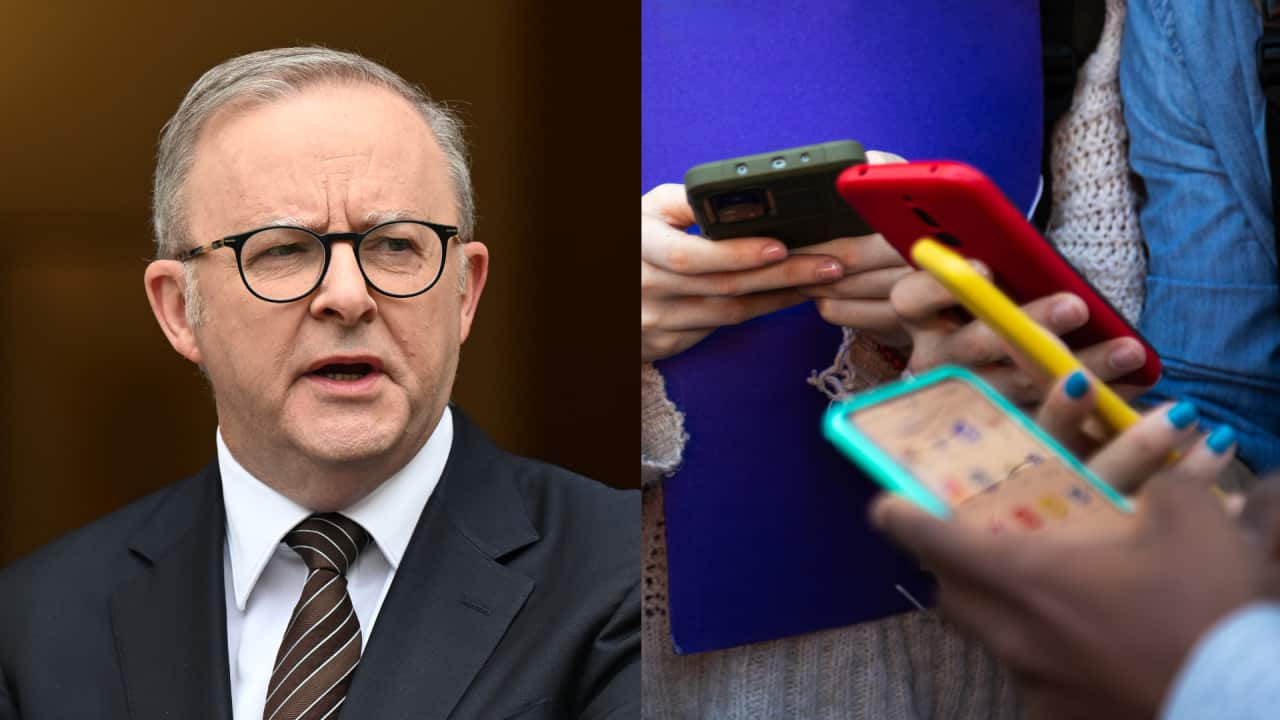The ban, which will take effect in late 2025 and has made global news, has from governments, tech companies, and citizens worldwide.
The ban will capture platforms such as Facebook, Instagram, Snapchat, Reddit and X.
Exemptions will apply for health and education services including YouTube, Messenger Kids, WhatsApp, Kids Helpline and Google Classroom.
Social media sites will have to take reasonable steps to prevent under-16s from creating accounts, with $50 million fines to be imposed on companies for systemic breaches.
News sites around the world, such as the New York Times, Spain's El País, India's Amar Ujala, BBC News and the South China Morning Post, all reported on the bill passing the Senate.

The new law will take 12 months to implement and has caused mixed reactions around the world. Source: SBS News
Divided reactions around the world
The story has attracted debate and commentary from users on some news sites.
A New York Post article titled Australia passes first-ever social media ban for children under 16 drew mixed comments, with one user saying: "Australia will be a well-watched social experiment. Get the popcorn ready."
Another said the United States should follow suit: "Just like alcohol and voting, America should only allow adults who have some semblance of maturity to access social media. It is destructive and can easily ruin lives."
Young people from around the world also expressed varied opinions on the legislation when interviewed by Reuters news agency.
High school student Kerstein Gomez from Havana, Cuba, said the ban is a "bit extreme".
"It is true that there is content on social media that is not exactly content that teenagers should see, but despite that, I think this measure is a bit extreme because it is limiting us all from what we can receive, the positive things we can receive from social media," she said.
Javier Martinez, 12, told Reuters it was a "crazy" decision.
"I would not like this to happen in Spain," he said.
Parisian student Amal Alfra said banning social media for teenagers under 16 years old is "a bit late".
"Everything is done today on social media," she said. "And so I think this is a bit out of touch with reality."
However, 24-year-old Mia Hanson from London said it was "good to have some sort of limitations for younger kids" on social media.
"There's a lot of stuff online which is quite dangerous and scary for young kids to see, so I think it's good to have some sort of ban," she said.
Anthony Albanese says the ban is a 'social responsibility'
Prime Minister Anthony Albanese addressed the new law in a press conference on Friday morning.
"Platforms now have a social responsibility to ensure the safety of our kids is a priority for them," he said.
He added: "We don't argue that its implementation will be perfect. Just like the alcohol ban for under 18s, it doesn't mean that someone under 18 never has access, but we know that it's the right thing to do."
But Sunita Bose, managing director of tech industry advocacy group DIGI, said there were still many questions about how the ban would work.
"The social media ban could push young people into darker, less safe corners of the Internet that do not have the safety guardrails that exist on mainstream platforms," she said.
Opposition communications spokesperson David Coleman said the Coalition would make enforcing the ban a priority should they win government at the next election.
"This new law will make a real difference for Australian families," he said.
"It has taken longer than we would have liked for the government to act, but we are pleased that this law has now passed the parliament."

Prime Minister Anthony Albanese said the world-first social media ban for people younger than 16 will lead to less harm and better outcomes for children. Source: AAP / AAP
"The task now turns to ensuring there is productive consultation on all rules associated with the bill to ensure a technically feasible outcome that does not place an onerous burden on parents and teens," Meta said.
Owner of social media platform X Elon Musk has previously referred to the law as a "backdoor way to control access to the internet by all Australians".
Which countries could be next?
The Social Media Minimum Age bill sets Australia up as a test case for a growing number of governments that have legislated or said they plan to legislate an age restriction on social media amid concern about its mental health impact on young people.
Countries, including France and some US states, have passed laws in an attempt to restrict access for minors without a parent's permission, but the Australian ban is absolute.
A full under-14s ban in Florida is being challenged in court on free speech grounds.
The United Kingdom has discussed a similar ban on social media for people under 16. In an interview with the BBC, the country's technology secretary, who responded to questions about following Australia's lead, said: "Everything is on the table with me."
The European Union introduced legislation banning under-16s from online services without parental consent in 2015 but allowed countries to opt out of the age ban.
With reporting by the Australian Associated Press.


